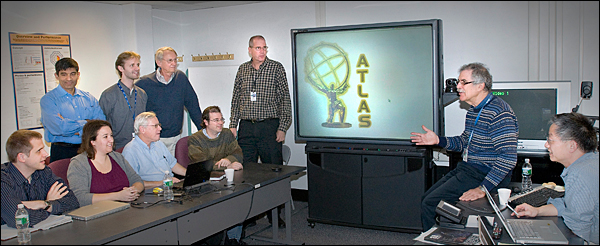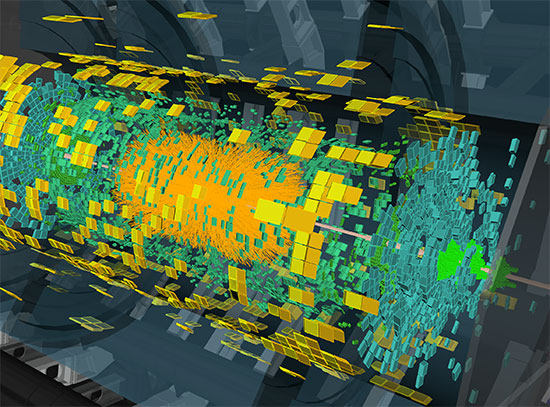Brookhaven Hosts ATLAS Jamboree in Anticipation of LHC Second Run
December 3, 2009
As scientists in Switzerland were busy preparing to restart the Large Hadron Collider (LHC) a year after an accident disabled the massive particle accelerator, scientists at Brookhaven National Laboratory were practicing the skills they will need to sort through the machine’s data.

Howard Gordon (right) speaking at Brookhaven’s latest ATLAS Jamboree, where physicists practiced the data analysis skills they would need once experimentation resumed at the Large Hadron Collider.
Brookhaven is one of three analysis support centers in the United States whose mission is to support U.S. scientists working on the ATLAS experiment at the LHC. The lab hosts several “ATLAS Jamborees” each year covering a range of topics to help train current and future ATLAS users in the analysis of the experiment’s data.
The attendees at the November 17-20 gathering were a mixture of graduate students, post-docs, professors, and career physicists. They came from a range of institutions across the United States, including BNL, Columbia, Iowa State, New York University, the University of Oklahoma, Oklahoma State, the University of South Carolina, the University of Toronto, Yale, Harvard, Duke, and Stony Brook University. Jamboree participants listened to formal talks by various experts and participated in skills workshops, while taking advantage of the opportunity to network and discuss research with colleagues.
ATLAS is one of the LHC detectors, and is designed to find whatever particles are created by the near-light speed collisions of protons. One of its greatest tasks is to search for a particle called the Higgs boson, which may be the source of mass for all matter. More than 40 institutions in the United States are members of the ATLAS collaboration and worldwide, there are about 2,800 participants from 37 countries.
“We’re trying to understand what gives particles their mass, and the Higgs is conjectured to give particles their mass,” said Brookhaven physicist Howard Gordon. “It’s so interesting that there are 2,800 people around the world that are interested in the same question.”
The data collected at ATLAS will either confirm or challenge existing theories of the fundamental properties of the universe. Either way, scientists all over the world are eager to get their hands on the data, after over a year of unexpected delays. Once ATLAS is online, however, handling the detector’s data will be no easy task.
According to Gordon, the LHC will produce about 40 million collisions of proton-proton bunches every second at ATLAS when experimentation begins in earnest. The detector is like a huge digital camera capturing high-resolution images of these collisions. But if it saved all these images, it would immediately accumulate petabytes of data. To put that into perspective, if you tried to fit a petabyte (one million gigabytes) onto CDs, they would form a stack over a mile high.
In order to condense the amount of available data, special trigger hardware and software has been developed to automatically select only the most potentially interesting collision data. Scientists researching the ATLAS project will need to know how to operate this trigger and then efficiently analyze the detector’s data. Analysis Support Centers such as Brookhaven bring these scientists together to help them develop these skills.
One such scientist at this latest ATLAS Jamboree was Stephanie Majewski, a Brookhaven post-doctoral research associate. Stationed at CERN, she has been preparing for the early analyses and evaluations of the detector’s performance.
“Brookhaven is a U.S. support center, so a lot of students and people new to the collaboration can come here and learn the newest tools or learn how to run the software—that’s a big part of it,” Majewski said.
Majewski was optimistic that the LHC would restart without any of last year’s problems. When she was last in Switzerland working on the detector commissioning, she could feel the anticipation building.
“People are getting very excited now,” she said. “People are really hurrying to get everything ready.”
Her optimism was well-founded. On the last day of the Brookhaven ATLAS Jamboree, CERN announced that it had successfully resumed circulation of protons in the collider. They plan to accelerate particles to higher energies in the coming months.
2009-1529 | INT/EXT | Newsroom







